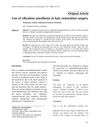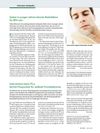 September 2018 in “Fertility and Sterility”
September 2018 in “Fertility and Sterility” African American women have a higher risk of preterm delivery than Caucasian women, and inflammatory stimuli affect gene expression in cells related to PCOS, showing a heightened inflammatory state in women with PCOS.
 March 2018 in “Journal of Pakistan Association of Dermatology”
March 2018 in “Journal of Pakistan Association of Dermatology” Vibration anesthesia effectively reduces pain during hair restoration surgery.
 October 2013 in “Journal of the American College of Cardiology”
October 2013 in “Journal of the American College of Cardiology” People with non-dipper hypertension have higher aldosterone levels, more strain on their heart's venous system, and increased risk of endothelial dysfunction.

Men with early balding may have a higher risk of prostate issues, and surgery for prostate cancer has a slight survival benefit over radiation.
 March 2012 in “Journal of the American Academy of Dermatology”
March 2012 in “Journal of the American Academy of Dermatology” African Americans lack knowledge about laser hair removal safety, Nd:Yag laser treatment is effective with high satisfaction, pressure during surgery can cause hair loss, and treating ovarian inflammation may help with alopecia areata.
 January 2012 in “Yearbook of Dermatology and Dermatologic Surgery”
January 2012 in “Yearbook of Dermatology and Dermatologic Surgery” Iron deficiency is not more common in women with hair loss, and neurogenic rosacea may need different treatment.
 47 citations,
June 2011 in “Movement Disorders”
47 citations,
June 2011 in “Movement Disorders” The LRRK2-G2019S mutation in Parkinson's disease has a lifetime penetrance of 25-35%, and finasteride may help reduce symptoms in adult male Tourette syndrome patients.
 36 citations,
August 2011 in “Experimental Dermatology”
36 citations,
August 2011 in “Experimental Dermatology” Eccrine sweat gland's clear cells likely cause excessive sweating in hyperhidrosis.
 8 citations,
July 2018 in “European Journal of Dermatology”
8 citations,
July 2018 in “European Journal of Dermatology” A medication may help with hair growth in psoriasis, and a skin condition might be linked to a specific bacteria.
 3 citations,
May 2019 in “Cytotherapy”
3 citations,
May 2019 in “Cytotherapy” ATIR101 improves survival in stem cell transplant patients; Australian stem cell treatment decisions are influenced by regulation changes.
 1 citations,
January 2005 in “Acta dermato-venereologica”
1 citations,
January 2005 in “Acta dermato-venereologica” The document recommends three dermatology books for their valuable content on evidence-based medicine, comprehensive treatment descriptions, and updated information on hair and scalp disorders.
 1 citations,
May 2001 in “The Cleft Palate Craniofacial Journal”
1 citations,
May 2001 in “The Cleft Palate Craniofacial Journal” The document recommends both books for medical training in aesthetic surgery and wound healing.
 January 2023 in “Brazilian Journals Editora eBooks”
January 2023 in “Brazilian Journals Editora eBooks” Girls with Autism Spectrum Disorder may show different symptoms than boys, leading to missed or delayed diagnoses.
 November 2020 in “Journal of The American Academy of Dermatology”
November 2020 in “Journal of The American Academy of Dermatology” Certain immune markers may predict chemotherapy response in mesothelioma, and nivolumab is a tolerable and effective treatment for advanced non-small cell lung cancer.
December 2018 in “International journal of women’s dermatology” Early diagnosis and strong corticosteroids are crucial for managing lymphocytic cicatricial alopecia.
 October 2013 in “Journal of the American College of Cardiology”
October 2013 in “Journal of the American College of Cardiology” Autonomic dysfunction is common in hypertensives but may not cause diastolic dysfunction in resistant hypertension.
 September 2008 in “Fertility and Sterility”
September 2008 in “Fertility and Sterility” Free fatty acids may increase androgen production, potentially contributing to polycystic ovary syndrome.
 June 2003 in “Obstetrical & Gynecological Survey”
June 2003 in “Obstetrical & Gynecological Survey” Postmenopausal ovary stromal cells have a unique makeup and limited steroid production, suggesting androgens come from the adrenal gland.
 December 2002 in “International Journal of Cosmetic Surgery and Aesthetic Dermatology”
December 2002 in “International Journal of Cosmetic Surgery and Aesthetic Dermatology” The books are valuable resources for cosmetic surgery and dermatology professionals.
 April 2018 in “Journal of Investigative Dermatology”
April 2018 in “Journal of Investigative Dermatology” Arrector pili muscle regulates hair follicle stem cells, DNA methylation needed for hair cycling, and Wnt/B-catenin signaling starts hair growth.
 January 2012 in “Yearbook of Dermatology and Dermatologic Surgery”
January 2012 in “Yearbook of Dermatology and Dermatologic Surgery” No significant difference in iron deficiency between women with or without hair loss.
 February 2005 in “The Journal of Urology”
February 2005 in “The Journal of Urology” Finasteride for hair loss doesn't harm erectile function; weight loss and exercise improve it.
 August 2002 in “Dermatologic Surgery”
August 2002 in “Dermatologic Surgery” Fluridil safely promotes hair growth in men with androgenetic alopecia.
170 citations,
May 1979 in “The journal of pediatrics/The Journal of pediatrics” Two sisters with rickets and hair loss had a genetic issue with vitamin D processing, and only improved when given phosphorus supplements.
 74 citations,
January 2015 in “Asian Journal of Transfusion Science”
74 citations,
January 2015 in “Asian Journal of Transfusion Science” Platelet-rich plasma (PRP) injections can effectively increase hair density and thickness in people with androgenic alopecia, without major side effects.
 67 citations,
January 2022 in “Theranostics”
67 citations,
January 2022 in “Theranostics” Advanced nanocarrier and microneedle drug delivery methods are more effective, safer, and less invasive for treating skin diseases.
41 citations,
November 2015 in “The journal of investigative dermatology. Symposium proceedings/The Journal of investigative dermatology symposium proceedings” Diphenylcyclopropenone (DPCP) can help regrow hair in many alopecia areata patients but may cause side effects and relapses.
 41 citations,
August 1988 in “Journal of The American Academy of Dermatology”
41 citations,
August 1988 in “Journal of The American Academy of Dermatology” A woman with subacute cutaneous lupus erythematosus had widespread skin symptoms triggered by medication and sunlight, which improved with specific treatments.
40 citations,
July 2011 in “The journal of clinical hypertension” Hydralazine and minoxidil are blood pressure medications that relax blood vessels, with potential side effects like rapid heartbeat and fluid retention, and are used for severe or pregnancy-related hypertension.
 38 citations,
January 2009 in “Journal of Cutaneous Medicine and Surgery”
38 citations,
January 2009 in “Journal of Cutaneous Medicine and Surgery” A woman developed hair loss after starting a treatment with adalimumab, suggesting this medication might cause hair loss.

























